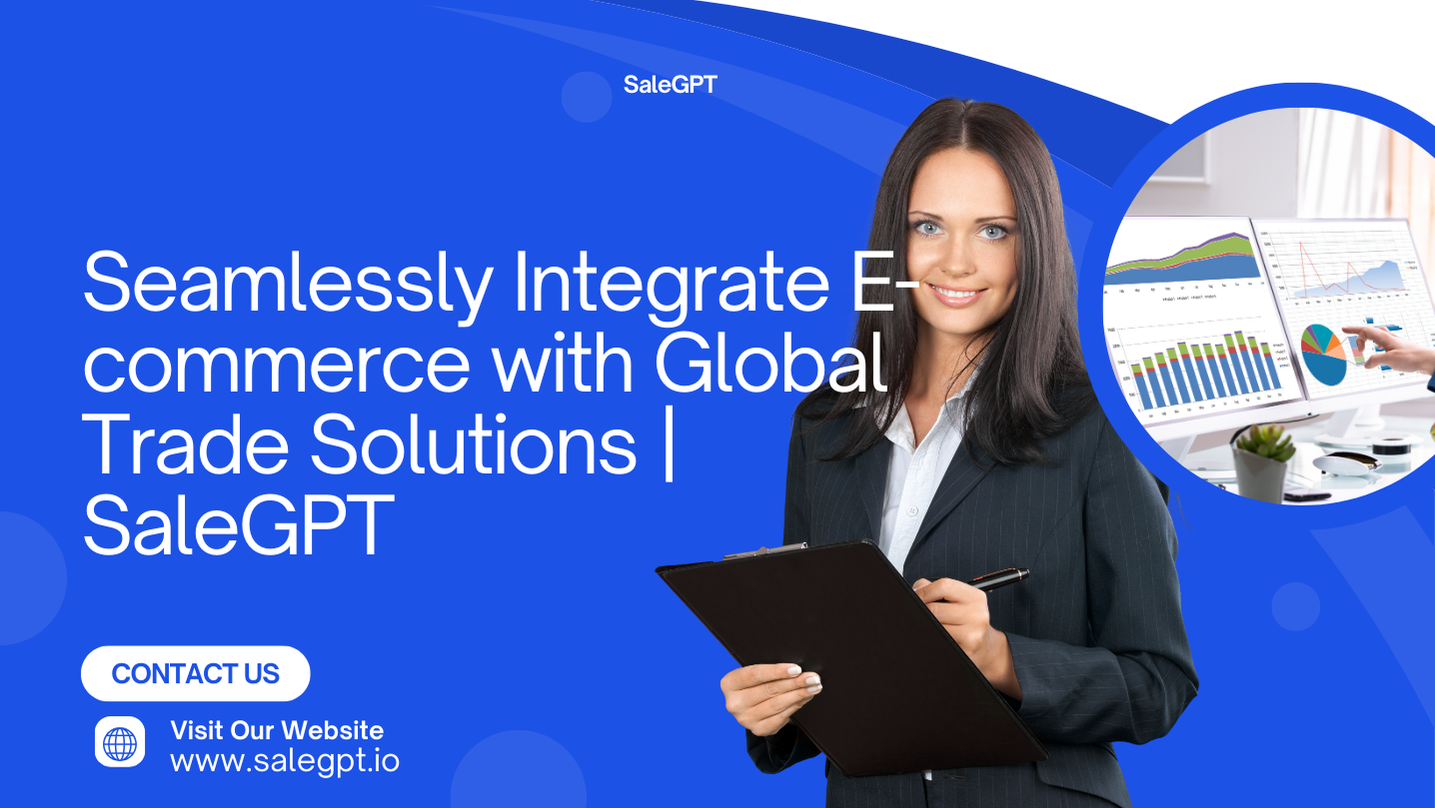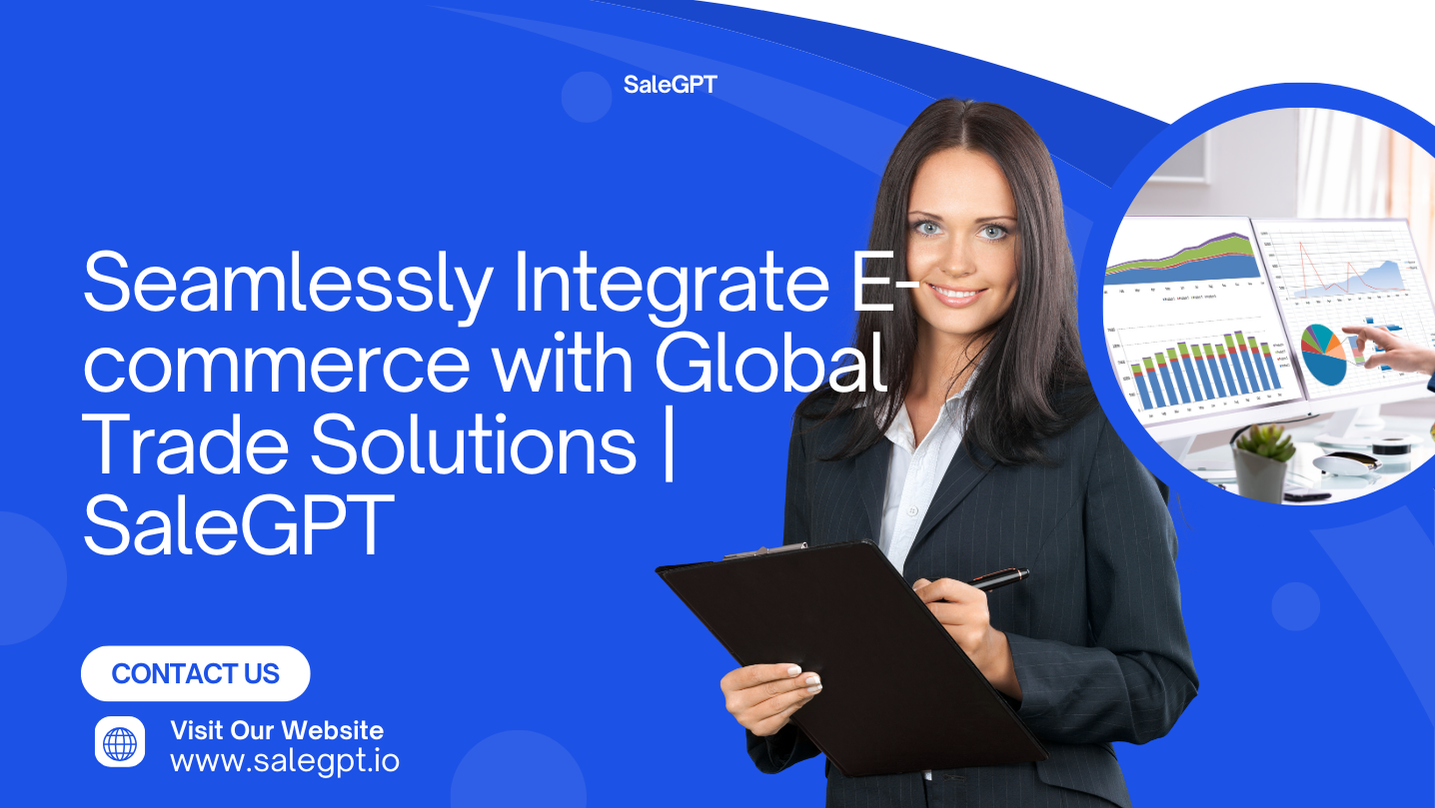The Power ofE-commerce Integration in Global Trade
As global trade becomes more complex, the need for seamless integration between e-commerce platforms and international trade solutions has never been more critical. E-commerce businesses now face the challenge of managing multiple sales channels, shipping logistics, payment processing, and compliance regulations across various regions. By integrating e-commerce with global trade solutions, businesses can streamline operations, reduce friction, and increase efficiency, all while expanding their global reach.
SaleAI offers an intelligent approach to e-commerce integration, providing a unified platform that connects all aspects of international sales, from inventory management to shipping and payments, ensuring a smooth experience for both businesses and their customers.
WhyE-commerce Integrationis Essential for Global Trade
Integrating e-commerce systems with global trade solutions can significantly improve operational efficiency, customer satisfaction, and business scalability. Here are a few reasons why this integration is crucial for success in the global marketplace:
-
Global Reach with Localized Solutions: E-commerce businesses need to tailor their offerings for different international markets. By integrating with global trade solutions, businesses can localize product offerings, payments, and logistics to meet the specific needs of each region.
-
Streamlined Order Management: Managing orders across multiple regions can be overwhelming without proper integration. E-commerce platforms that integrate with global trade solutions allow businesses to manage their inventory, shipping, and payments from one centralized system, reducing manual work and the risk of errors.
-
Optimized Cross-Border Payments: Cross-border payments are a common pain point in international e-commerce. By integrating e-commerce with trade solutions, businesses can provide a seamless and secure payment experience for customers, making it easier to accept payments in different currencies and regions.
-
Improved Compliance and Risk Management: Navigating customs regulations, tax requirements, and trade restrictions can be daunting. With integration, businesses can automate compliance checks, ensuring that products meet all necessary regulations before they are shipped, reducing the risk of costly fines and delays.
HowSaleAIEnhances E-commerce Integration for Global Trade
SaleAI offers a robust suite of tools designed to help businesses easily integrate their e-commerce platforms with global trade solutions. Here’s how:
-
Seamless E-commerce Platform Integration: Whether you’re using Shopify, WooCommerce, Magento, or any other platform, SaleAI can integrate seamlessly with your existing e-commerce setup, ensuring that your sales data, customer information, and product listings are automatically synchronized.
-
Unified Inventory Management: Managing inventory across multiple regions is a challenge.SaleAI’s global trade solutionsoffer centralized inventory management, helping businesses track stock levels in different regions, prevent overselling, and streamline order fulfillment.
-
Real-Time Shipping and Logistics: Shipping logistics are a critical component of international trade. SaleAI integrates with global shipping providers to offer real-time tracking, automated shipping labels, and custom clearance support, ensuring that products are delivered efficiently and on time.
-
AI-Powered Customer Insights: Integration with global trade solutions also helps businesses gather and analyze customer data across different regions. With SaleAI, AI-powered insights allow businesses to better understand customer preferences, purchasing behaviors, and regional trends, helping to personalize marketing strategies and product offerings.
HowE-commerce IntegrationDrives Business Growth
Integrating e-commerce with global trade solutions is not just about making processes more efficient—it’s also about driving business growth. Here’s how this integration supports long-term success:
-
Expanded Market Reach: By integrating e-commerce with global trade solutions, businesses can quickly scale their operations into new international markets. Whether it’s entering emerging markets in Asia, Europe, or Latin America, e-commerce integration allows businesses to cater to new audiences with minimal friction.
-
Increased Sales Efficiency: Automation reduces manual work, speeds up order processing, and improves response times to customers. This means that businesses can handle a higher volume of orders, boosting their sales without increasing overhead costs.
-
Better Customer Experience: A seamless experience—from browsing to checkout to delivery—improves customer satisfaction and loyalty. E-commerce integration ensures that customers receive timely updates, personalized offerings, and hassle-free shipping, all of which increase the likelihood of repeat purchases.
-
Agility in a Competitive Market: With the global market becoming increasingly competitive, businesses need to be agile and responsive. Integrated systems provide businesses with the tools to quickly adapt to changing market conditions, customer preferences, and regulatory requirements.
Key Benefits of E-commerce Integration forGlobal Trade
-
Increased Efficiency: Automation of key processes such as inventory management, shipping, and payments reduces the burden on human resources and accelerates business operations.
-
Cost Savings: By streamlining logistics and reducing the risk of compliance errors, e-commerce integration helps businesses save on operational costs.
-
Faster Market Expansion: Integration allows businesses to scale into new markets faster by automating key functions and ensuring compliance with local regulations.
-
Improved Data Management: Centralized systems offer better data management, allowing businesses to access real-time insights into sales performance, customer preferences, and inventory levels.
Conclusion
Integrating e-commerce with global trade solutions is essential for businesses that want to expand internationally. WithSaleAI, you can seamlessly connect your e-commerce platform with global trade solutions, optimizing sales operations, improving customer experience, and unlocking new growth opportunities. Whether you're a startup or an established brand, leveraging this integration is the key to long-term success in the global marketplace.






